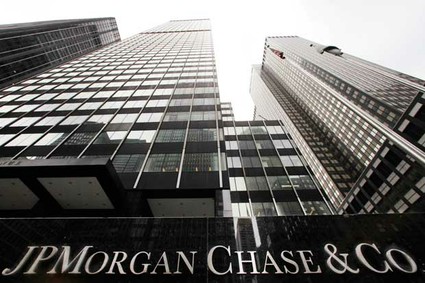* JPMorgan reviewing Nigeria bond status
* Nigeria accounts for 1.8 pct of emerging bond index
* Central bank tweaked FX market last week
JPMorgan will eject Nigeria from its Government Bond Index (GBI-EM) by the year-end unless it restores liquidity to currency markets in a way that allows foreign investors tracking the benchmark to transact with minimal hurdles.
The bank said late on Friday it had extended the deadline to eject Africa’s biggest economy by another six months to take into account the arrival of President Muhammadu Buhari.
Nigeria held closely-fought presidential elections in March, in which opposition leader Buhari defeated incumbent president Goodluck Jonathan, in the country’s first transition of power through the ballot box.
JPMorgan, which runs the most commonly used emerging debt indexes, placed Nigeria on a negative index watch in January and then said it would assess its place on the index over a three to five months period.
“Nigeria’s status in the GBI-EM series will be finalized in the coming months but no later than year-end,” JPMorgan said.
Removal from the index would force funds tracking it to sell Nigerian bonds from their portfolios, potentially resulting in significant capital outflows. This in turn would raise borrowing costs for Africa’s largest economy, already suffering from a sharp drop revenue following a plunged in oil prices.
Nigeria’s forex and bond markets have come under pressure after the price of oil, Nigeria’s main export, plunged. In response, the central bank fixed the exchange rate in February after devaluing the naira last year and tightened trading rules to curb speculation. The naira has lost 8.5 percent this year.
“If we are unable to verify these factors, a review of Nigeria’s status within the benchmark for removal will be triggered,” it said in report, adding that the factors included a liquid currency market.
Analysts did not expect JPMorgan to remove Nigeria.
JPMorgan added Nigeria to the widely followed index in 2012, when liquidity was improving, making it only the second African country after South Africa to be included. It added Nigeria’s 2014, 2019, 2022 and 2024 bonds.
The bank said Nigeria continues to remain eligible for the GBI-EM index, which has around $210 billion in assets under management benchmarked to it, with a weight of 1.8 percent.
The central bank last week made a tiny adjustment to its exchange rate peg to the dollar, which one analyst said may indicate that it is beginning to think about how to loosen its currency regime. (Editing by David Evans)
FRENCH VERSION
* Nigeria représente 1,8 % des émergents indice obligataire
* Banque centrale tordu marché FX la semaine dernière
JPMorgan éjectera Nigéria depuis sa Government Bond Index(GBI-EM) la fin de l’année à moins qu’il restaure des liquidités auxmarchés de devises d’une manière qui permet aux investisseursétrangers l’indice de référence de suivi à effectuer destransactions avec des haies minimes.
La Banque a déclaré tard vendredi qu’il avait prolongé le délaipour éjecter la plus grande économie de l’Afrique par un autresix mois, afin de tenir compte de l’arrivée du PrésidentMuhammadu Buhari.
Nigeria tenue serrée des élections présidentielles en mars, danslequel l’opposition leader Buhari défait Président sortantGoodluck Jonathan, dans la première transition du pouvoir parles urnes.
JPMorgan, qui exécute le plus couramment utilisé de nouveauxindices de la dette, placé le Nigeria sur une montre d’indicenégatif en janvier et puis il a dit qu’il évaluerait sa place surl’indice sur une période de trois à cinq mois.
« Statut du Nigeria dans la série de GBI-EM sera finalisé dans lesprochains mois, mais plus tard à la fin de l’année », a déclaréJPMorgan.
Supprimé de l’index forcerait les fonds pour vendre desobligations nigérianes de leurs portefeuilles, entraînantpotentiellement importantes sorties de capitaux de suivi. Celasoulèverait à son tour les coûts d’emprunt pour la plus grandeéconomie de l’Afrique, qui souffrent déjà d’une forte baisse desrevenus après un plongés dans des prix du pétrole.
Du Nigeria forex et des marchés obligataires sont venus souspression après que le prix du pétrole, principal produit d’exportation du Nigeria, plongé. En réponse, la Banque centralefixe le taux de change en février après la dévaluation le naira l’andernier et resserré les règles pour freiner la spéculation denégociation. Le naira a perdu 8,5 % cette année.
« Si nous sommes incapables de vérifier ces facteurs, un examende la situation du Nigeria au sein de l’indice de référence pourl’enlèvement se déclenchera, » il a dit dans le rapport, ajoutantque les facteurs incluaient un marché de la monnaie liquide.
Les analystes ne s’attendait pas à JPMorgan pour éliminer leNigeria.
JPMorgan a ajouté Nigéria à l’indice largement suivie en 2012,lorsque la liquidité s’améliore, ce qui en fait seulement ledeuxième pays africain après l’Afrique du Sud à être inclus. Elle aajouté du Nigéria 2014, 2019, 2022 et 2024 liaisons.
La Banque a déclaré que Nigéria continue à demeureradmissibles à l’index GBI-EM, qui compte environ $ 210 milliardsd’actifs sous gestion comparé à elle, avec un poids de 1,8 p. 100.
La Banque centrale la semaine dernière a fait un petit ajustementà sa cheville de taux de change du dollar, dont un analyste ditpeut indiquer qu’il commence à réfléchir à la manière dedesserrer son régime monétaire. (Montage par David Evans)


